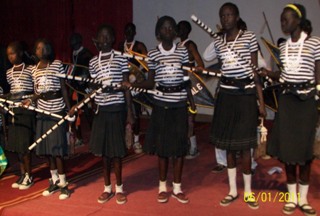Sudan’s Nuer community celebrates legacy, advocates independent South
January 7, 2011 (JUBA) – The Nuer ethnic group, the second largest community in Southern Sudan after the Dinka tribe, organized a celebration on Thursday for its legacy on the eve of the region’s referendum on independence of the region.

The community inhabits a long belt of territory right from the Ethiopian border in the extreme eastern part of Upper Nile state, stretching through Jonglei state and across the River Nile to the west bank in Unity state bordering Warrap state in the Greater Bahr el Ghazal region.
The celebration was organized by the Nuer Youth Union (NYU) from the three states of Unity, Upper Nile and Jonglei. Thousands of youth converged at Nyakuron Culture Center in the Southern Sudan’s capital, Juba, in what the organizers said was a celebration of great legacy of the Nuer community in their contribution to the south’s liberation struggle dating back to the resistance against the Turkish and British colonial era’s in Sudan.
They also used the occasion as an opportunity to mobilize the Nuer community to fulfill their aspirations and principles based on their culture of justice, equality and freedom of individual and society by voting for secession.
The celebration was attended by several Nuer elders from the three states of Greater Upper Nile, many of whom lectured on historical achievements by sons and daughters from the community during the more than 100 years of liberation struggle. Though similar gatherings had been organized in the past, the event this week came two days before the people of Southern Sudan will vote to determine their future destiny.
Elders expressed their gratitude for the Nuer community, which they said, had contributed greatly to the championing and pushing forward the right to self-determination of the people of Southern Sudan which finally culminated in the referendum on independence due on Sunday.
Addressing participants in the hall packed with thousands of Nuer youth during the occasion at, the minister of Humanitarian Affairs and Disaster Management, James Kok Ruea, told the gathering that the great contributions by the community has brought southerners to where they are currently.
“Sons and daughters of the Nuer community might have been misunderstood by some at times during the struggle, but now the fruit of their contributions in calling for and championing self-determination has brought us to where we are now. We will vote for independence beginning in two days time, which came about because of the right to self-determination our sons and daughters greatly contributed to its championing”, he said.
James Kok called on the youth in particular and voters of the Nuer community in general to vote for secession. The call was also echoed by the GoSS minister of Youth and Sports, Makuach Teny Youk, who called on the youth to lead the vote for independence of the region.
Judge John Gatwech Lul, one of the three southerners in the nine-member Constitutional Court of Sudan, lectured on the community’s military officers who contributed during the struggle in Anyanya One rebel movement beginning with those who participated in the Torit Mutiny in August 1955 one year before Sudan became independent.
He also hinted the second rebellion in Akobo in 1975, which was headed by the then 1st Lt.Vincent Kuany Latjor, who established his military base at Bilpam, in Eastern Nuer territory at the Ethiopian border, until the SPLM/A was later on formed and established in Bilpam in 1983.
The SPLM’s war with various Khartoum governments ended in 2005, where both sides agreed the south would be given the right to secede through a referendum. Southern Sudan is widely expected to vote for independence. Voting begins on Sunday and will run until January 15.
(ST)
